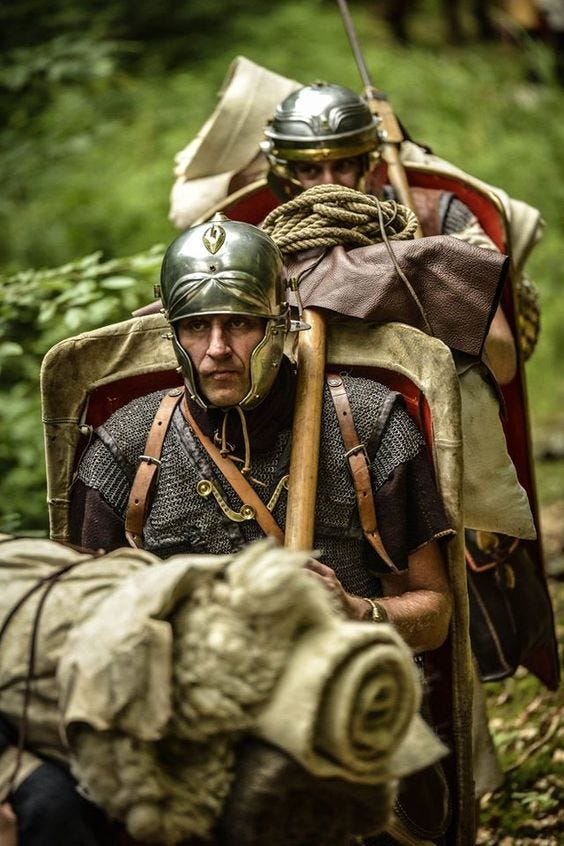
(Notes:Player's Handbook (PHB) and Dungeon Master's Guide (DMG) for Advanced Dungeons & Dragons, 1st Edition (AD&D1e) cited as needed.)
AD&D1e is a wargame. It is not presumed that your man just goes from Town to Dungeon unless Town is a literal camp at the mouth of same. That means that you are going to travel overland some distance.
Be it on foot, mounted, or in a cart or wagon you're still going to figure out things how far you can travel in a day given the terrain and the degree of security in that area, what you need to do to avoid getting lost, provisions to sustain yourself along the way (in both directions), and otherwise think more like a quartermaster and less like a Shounen Protagonist.

This starts with what your man carries. Remember all that gear you bought? If you haven't already, go back and add up that Encumbrance value. You'll your man's Strength (STR) score adjustment to his Weight Allowance (PHB p. 9) which starts at 35 lbs. (p. 101) for Unencumbered. If your armor doesn't slow you down, hauling a lot of stuff will.
This will matter if your man hits a big horde of treasure and needs to haul it out.

Combined, you get your man's Movement Rate. This is listed in inches, but that translates differently depending upon the mode of play. In the Dungeon, that is 1 inch to 10 feet over a 10 minute Turn; outdoors this means Miles Per Half-Day (beause the other half is making or striking camp). During Encounters, you use the Dungeon ratio for movement per Round (and one-tenth that per Segment, where that is relevant).
(Note: PHB p.102 notes the above and modifications to Dungeon movement under non-exploratory modes of movement.)
The savvy reader will note that a successful adventurer ensures that he leaves himself plenty of room for that treasure horde to be hauled out of the Dungeon. There's other way to handle this than just having an empty pack and a strong back, but that's for another post.

Ready to lead that party to the Dungeon? Your column of up to 100 men (DMG p.49) will move at the standard rate, slowing incrementally with each additional century's worth of men (or fraction thereof), but that's just a matter of proper time management. The real issue is if you don't already know the way.
Getting lost? (ibid) That's a real issue, and it's why armies have scouts- and why you need to keep a Ranger (preferably) on your side.
If you're the sort to make the most of proper timekeeping (p. 49), you'll ensure that whomever you have on hand to scout does so before you and the boys get together to play that day around the table. If it worked for the Romans, Cartheginians, Greeks, Persians, and many others it will work in your campaign.

If your circumstances allow it, form a base camp near the Dungeon's mouth in a concealable or defensible location. By near I mean "within sight" and not "miles away". This allows your delves into the Dungeon to start earlier, and allows a savvy adventurer to set up a secure route back to Town that eliminates the threat of Getting Lost as well as speed ups travel between those two points.
A savvy Patron, seeking to simultaneously secure territory and cultivate talent, will sponsor such operations without being asked in return for favorable considerations regarding recovered treasure or other useful discoveries- much like modern-day treasure hunting.
But I get ahead of myself. More on this tomorrow.
No comments:
Post a Comment
Anonymous comments are banned. Pick a name, and "Unknown" (et. al.) doesn't count.